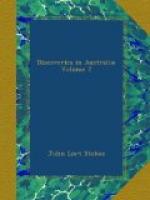Though, however, we may not attain to a knowledge of the truth at once, yet should we never lose an opportunity of making a vocabulary of such words as we know to be correct. This should be the case from one consideration alone; for how gratifying it is, when visiting an uncivilized people, to find that you know a word or two of their language! The satisfaction is mutual—there is at once a sympathetic link between you—you no longer appear as thorough strangers to each other, and this slight knowledge of their dialect may often be the means of making useful acquaintances.
To return, however, to the thread of our narrative.
Leave port Darwin.
The opening to the westward, visited by Captain Wickham, requiring further examination, we left Port Darwin for that purpose, beating out on the morning of the 26th. Before taking leave, however, of this place, it will not be deemed irrelevant if we give some slight description of it. The entrance points, I have already said, are white cliffy projections, and distant from each other three miles. Just outside them lies a long four fathom bank, which, together with a very extensive flat of one, and two fathoms, nearly joining it from the eastern side, and another fronting the north side of the west entrance point, comprise all the dangers on entering this port; which, although of considerable size, is much occupied by shoal water, particularly on the western side, commencing from abreast of Talc Head. The best anchorage is near Point Emery. The extreme of the latter, and a clump of peaked bushes on the south point of the eastern arm of the harbour, when in one, make a good mark for leading out; passing on the west side of the four fathom bank, where the channel is a mile wide and 10 fathoms deep.
Irregularity of the tides.
The tide is very irregular in Port Darwin, rising at springs 24 feet, and at neaps sometimes only two; its rate being from one and a half to three knots. The time of high-water at the full and change of moon, was half-past five, which being half an hour earlier than at Clarence Strait, fully bears out the opinion I have before expressed, that the flood-tide comes from the westward.
Having to beat out against the seabreeze, the flood-tide made before we could get round the point on the coast lying midway between Ports Darwin and Patterson, and we were compelled to pass the night in the neighbourhood, a circumstance rendered disagreeable by the recurrence of another midnight squall from East-North-East, so severe as to require the use of a second anchor. The rain was so bitterly cold and sudden, as well as violent, acting also on our frames with more severity from the lightness of our clothing, that it had all the effect of a shower-bath, momentarily taking away the power of speech. It caused a rapid fall in the thermometer of ten degrees, bringing it as low as 60 degrees. At Port Darwin it had been regularly 87 and 89 degrees in the day, and 80 degrees at night.




